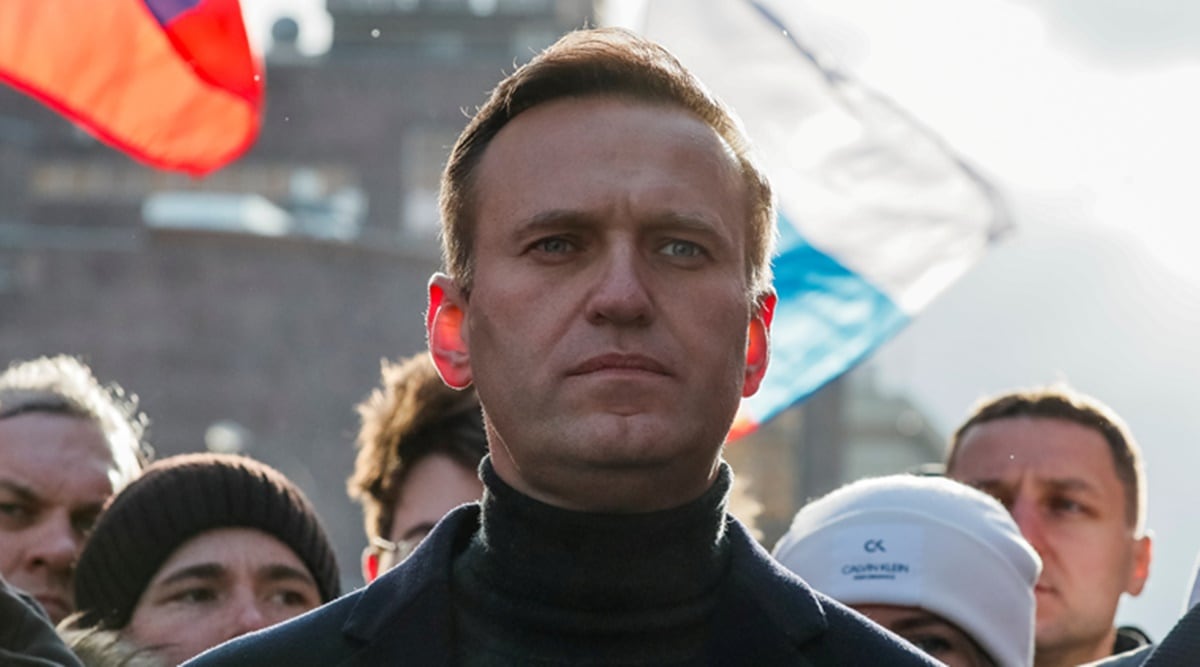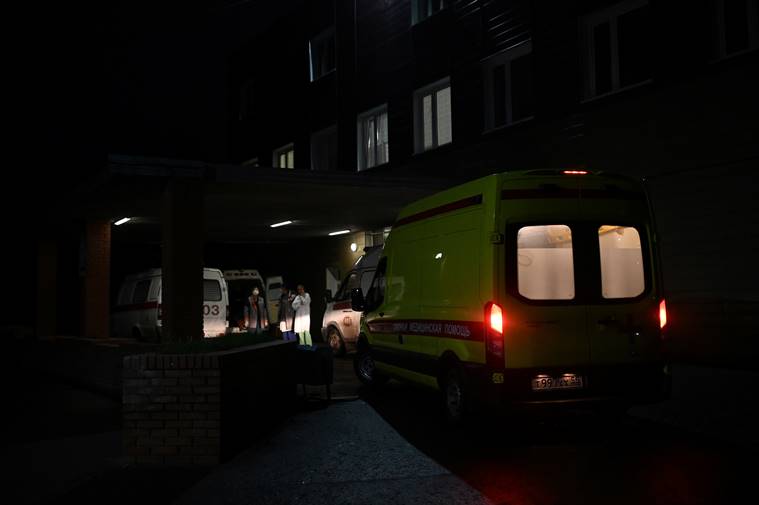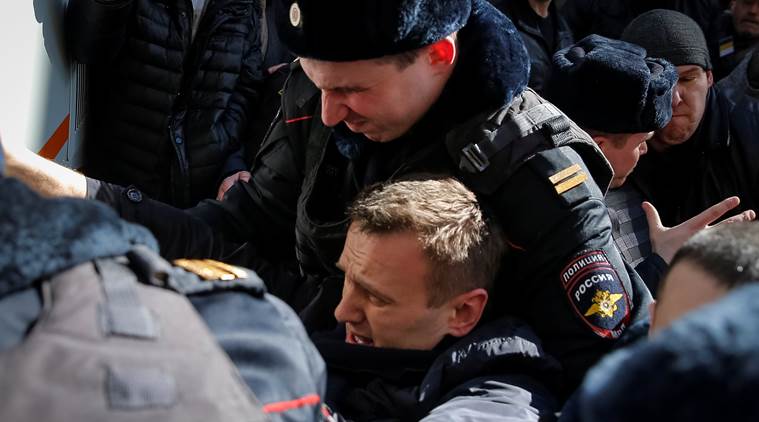Stay updated with the latest - Click here to follow us on Instagram
Alexei Navalny ‘poisoning’ case: Kremlin rejects accusations as ’empty noise’; latest developments
The politician's allies say the ruling Kremlin is behind the illness, with some demanding an investigation into whether Putin was involved.
 Alexei Navalny fell ill on a flight from Siberia to Moscow after having been poisoned with the Novichok nerve agent.
(Reuters/File)
Alexei Navalny fell ill on a flight from Siberia to Moscow after having been poisoned with the Novichok nerve agent.
(Reuters/File)A day after doctors indicated that Russian opposition leader Alexei Navalny was poisoned, the Kremlin Tuesday rejected the accusations of their involvement in the alleged attack on one of the most prominent critics of the government.
The 44-year-old foe of Russia’s President Vladimir Putin felt unwell on a flight back to Moscow from Tomsk Thursday last week and was taken to a hospital.
The politician’s allies say the ruling Kremlin is behind the illness, with some demanding an investigation into whether Putin was involved.
Navalny’s Foundation for Fighting Corruption has been exposing graft among government officials, including some at the highest level. Last month, he had to shut the foundation after a financially devastating lawsuit from Yevgeny Prigozhin, a businessman with close ties to the Kremlin.
Here’s everything that has happened in the case so far:
Alexei Navalny slips into coma after alleged poisoning
On August 20, Navalny felt unwell on a flight back to Moscow from Tomsk, a city in Siberia, and was taken to a hospital after the plane made an emergency landing in Omsk.
His spokesperson Kira Yarmysh said he must have consumed something from tea he drank at an airport cafe before boarding the plane early Thursday. During the flight, Navalny started sweating and asked her to talk to him so that he could “focus on a sound of a voice.” He then went to the bathroom and lost consciousness, she said.
Doctors in the Siberian city of Omsk refused to authorise the transfer of Navalny to a German hospital, his spokeswoman said.
 Ambulances and medical workers are seen outside the City Clinical Emergency Hospital Number 1 where Russian opposition leader Alexei Navalny was admitted after suffering severe symptoms of what his spokeswoman called poisoning, in Omsk, Russia. (REUTERS/Alexey Malgavko)
Ambulances and medical workers are seen outside the City Clinical Emergency Hospital Number 1 where Russian opposition leader Alexei Navalny was admitted after suffering severe symptoms of what his spokeswoman called poisoning, in Omsk, Russia. (REUTERS/Alexey Malgavko)
France, Germany offer assistance
World leaders, including Germany’s Angela Merkel and French president Emmanuel Macron, have offered “assistance” to Navalny, but refused to comment on speculations into the circumstances leading to his hospitalisation.
Macron told reporters Thursday “We are extremely worried and saddened” by what happened to Navalny, and that France offered the opposition leader and his family help with medical care or other unspecified protection. The President, however, insisted on the need to clarify what happened.
Don’t miss from Explained: Russia’s opposition leader who could be the latest victim of poisoning
German Chancellor Angela Merkel, speaking at a joint news conference with Macron, said Germany will also insist on transparency regarding Navalny’s illness and expressed support for him.
“Obviously Germany will let him have all the medical help that is needed also in German hospitals,” Merkel said. “But that must of course be a wish expressed from there.”
“What is also very important is that it will be clarified very urgently how it could come to the situation,” Merkel added.
 Police officers detain anti-corruption campaigner and opposition figure Alexei Navalny during a rally in Moscow, Russia, March 26, 2017. (File/REUTERS/Maxim Shemetov)
Police officers detain anti-corruption campaigner and opposition figure Alexei Navalny during a rally in Moscow, Russia, March 26, 2017. (File/REUTERS/Maxim Shemetov)
Navalny shifted to Berlin hospital, wife visits hospital
Over the weekend, Navalny was transferred to the Charit hospital in Berlin, where doctors on Monday said they have found indications of ‘cholinesterase inhibitors’ in his system.
Cholinesterase inhibitors act by blocking the breakdown of a key chemical in the body, acetycholine, that transmits signals between nerve cells. Navalny is being treated with the antidote atropine.
Navalny’s wife, Yulia Navalnaya, visited her husband but made no comment to reporters.
Kremlin denies hand in alleged poisoning
On accusations of their alleged involvement in the case, Kremlin spokesperson Dmitry Peskov Tuesday said, “These accusations absolutely cannot be true and are rather an empty noise.”
“We do not intend to take it seriously,” he added.
Peskov saw no grounds for launching a criminal investigation into Navalny’s condition, saying that it could have been triggered by a variety of causes, and determining one should come first.
“If a substance (that caused the condition) is found, and if it is determined that it is poisoning, then there will be a reason for an investigation,” Peskov said.
Russian govt showing reluctance to launch investigation: Navalny’s spokesperson
Navalny’s spokeswoman, Kira Yarmysh, Tuesday said the government’s reluctance to launch an investigation was expected.
“It was obvious that the crime would not be properly investigated and a culprit found. However, we all know perfectly well who that is,” Yarmysh tweeted.
Experts have cautioned that it is far too early to draw any conclusions about how the agent may have entered Navalny’s system, but note that Novichok, the Soviet-era nerve agent used to poison former Russian spy Sergei Skripal and his daughter in Britain, was a cholinesterase inhibitor.
“Cholinesterase inhibitor poisons can be given in many ways, they can be transported in many forms, and are very potent,” said Dr Richard Parsons, a senior lecturer in biochemical toxicology at King’s College London.
“This is why they are a favoured method of poisoning people.”
(With inputs from AP)
- 01
- 02
- 03
- 04
- 05































